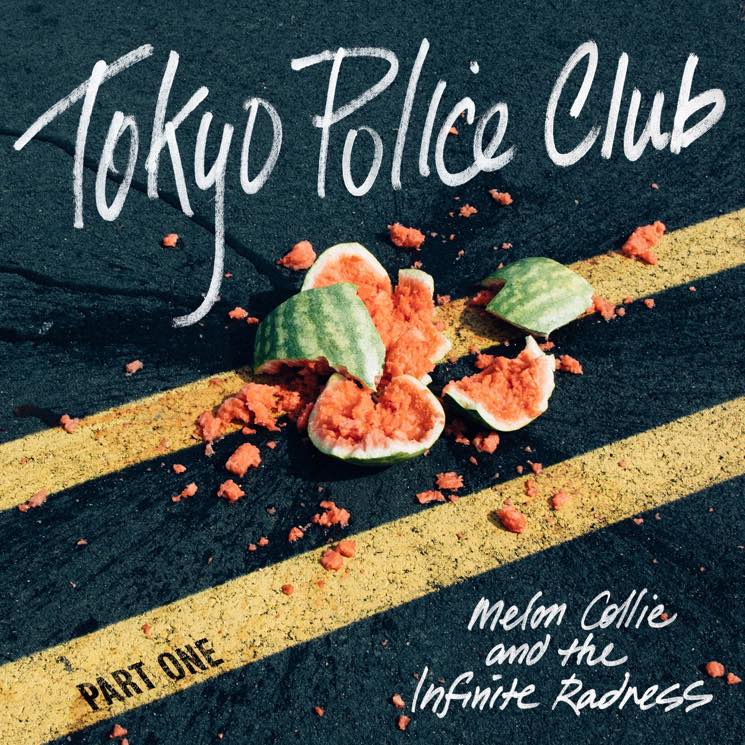It seems like Tokyo Police Club are not as unabashedly pop as we thought. Yes, the frenzied folly of their first few releases, debut EP A Lesson In Crime, first full-length Elephant Shell and follow-up Champ is gone. Then the "let's just make a record of catchy choruses" Forcefield divided fans into those that accepted the sound shift and those that called them about for being too radio-ready, tired and uninspired. Trying to prove that they're still idiosyncratic with the title, a play on the 1995 Smashing Pumpkins record (and oh look, the album art includes a smashed watermelon, how clever), Melon Collie and the Infinite Radness (Part 1) is in part marking the ten-year anniversary of A Lesson In Crime and simultaneously trying to recapture the charm and peculiarity of the way they were. Coming together in just over a week's time in NYC, this EP will make listeners pine for summertime, and perhaps pine for the band to continue moving in this direction.
Punchy single "Not My Girl" hints at the boisterous tunes of TPC past, and will likely fuel many upcoming summer shindigs, while the chorus will likely hatch an earworm in your head. "PCH" plays like Forcefield's "Hot Tonight" 2.0 — simple but not entirely satisfying, boasting the same sing-along quality with its refrain. "The Ocean," the EP's most produced and pop-minded but weakest cut, seems lyrically confused and has a forced youthfulness — "I had a little too much to drink, it goes down a little faster than I think, is it really gonna be ok?" — and the chorus's piano tinkling sounds a bit too clean and a tad out of place. Jangly "Losing You" is pleasant and bright, but slightly formulaic and falters when a goofy sounding keyboard solo kicks in for a spell. "Please Don't Let Me Down" (a plea from fans?) is the most upbeat offering, and features nostalgic group singing and handclaps, and some great fills from keyboardist Graham Wright.
In terms of lyrical creativity, Monks is capable of so much more — missing are the quirky quips and at times awkward phrasings, not to mention the use of terms like "tessellate." Musically speaking, the arrangements are friendly and fun but tame and a tad generic — Monks's bass playing is hardly featured (unlike it's wonderful role in tunes like Elephant Shell's "Your English Is Good" and Crime's "If It Works") and Wright isn't given as much time to shine.
Curious to see how TPC round out Melon Collie and the Infinite Radness with Part 2, hoping they can surprise by bringing back what initially made their keeners keen — the unexpected jittery melodies, the lyrical curiosities, a little rough and restless, unpolished and precisely their own.
(Dine Alone)Punchy single "Not My Girl" hints at the boisterous tunes of TPC past, and will likely fuel many upcoming summer shindigs, while the chorus will likely hatch an earworm in your head. "PCH" plays like Forcefield's "Hot Tonight" 2.0 — simple but not entirely satisfying, boasting the same sing-along quality with its refrain. "The Ocean," the EP's most produced and pop-minded but weakest cut, seems lyrically confused and has a forced youthfulness — "I had a little too much to drink, it goes down a little faster than I think, is it really gonna be ok?" — and the chorus's piano tinkling sounds a bit too clean and a tad out of place. Jangly "Losing You" is pleasant and bright, but slightly formulaic and falters when a goofy sounding keyboard solo kicks in for a spell. "Please Don't Let Me Down" (a plea from fans?) is the most upbeat offering, and features nostalgic group singing and handclaps, and some great fills from keyboardist Graham Wright.
In terms of lyrical creativity, Monks is capable of so much more — missing are the quirky quips and at times awkward phrasings, not to mention the use of terms like "tessellate." Musically speaking, the arrangements are friendly and fun but tame and a tad generic — Monks's bass playing is hardly featured (unlike it's wonderful role in tunes like Elephant Shell's "Your English Is Good" and Crime's "If It Works") and Wright isn't given as much time to shine.
Curious to see how TPC round out Melon Collie and the Infinite Radness with Part 2, hoping they can surprise by bringing back what initially made their keeners keen — the unexpected jittery melodies, the lyrical curiosities, a little rough and restless, unpolished and precisely their own.
